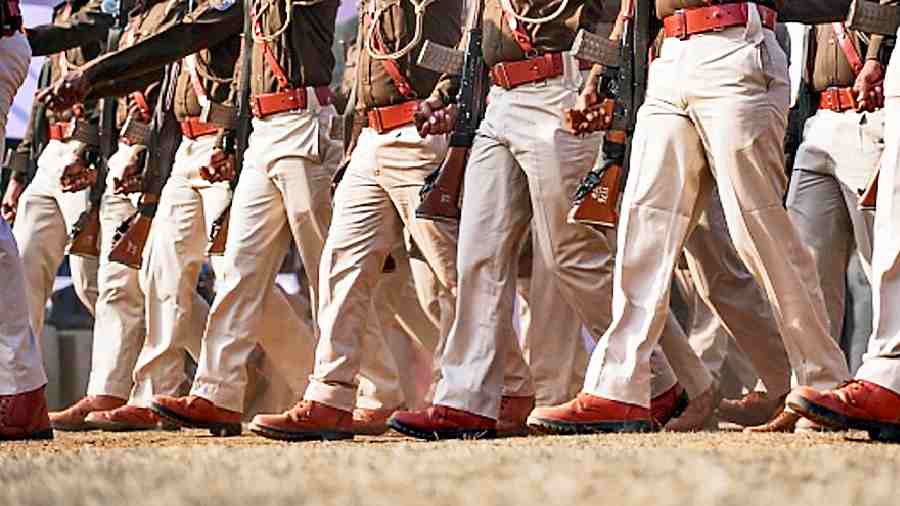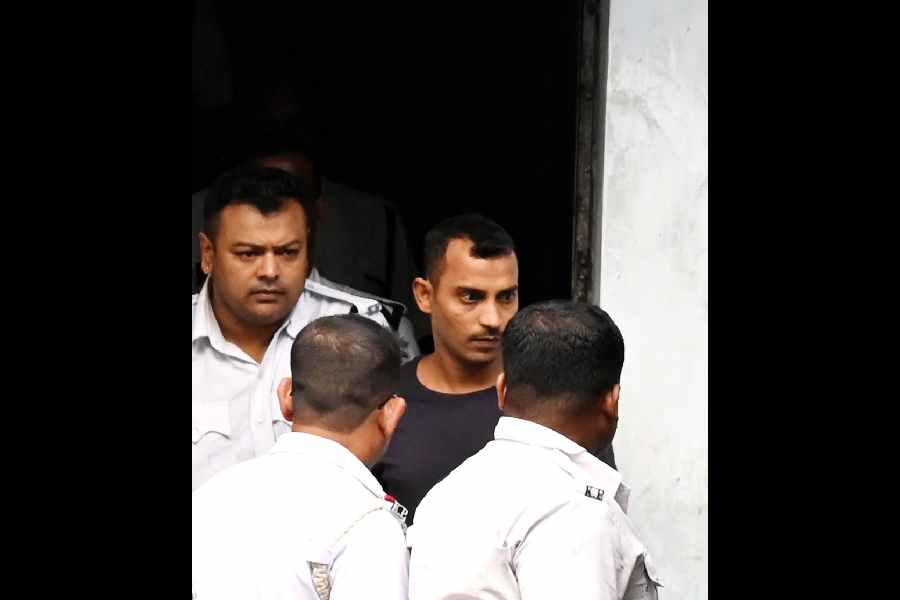In 1975, I was in Class Two. I am not sure why exams, which usually precede the summer, were being held in June when the Emergency was declared. But I clearly recall the boots and the noman’s land of hairy thighs between the starched shorts and the khaki socks that ran up till the knees.
It was my first encounter, up close and personal, with a police inspector in full regalia. I was all the more taken aback because the face at the end of the uniformed pyramid was familiar. Everybody in Thiruvananthapuram, the capital of Kerala, knew everyone else.
So did my father who knew the officer and I had often seen him at my home. But he was in civvies then and he was civil towards us in the perfunctory manner in which business-like adults indulge children.
On that morning at my school, there was no sign of civility. The only sound I could hear was of the grains of sand, swept in by irrepressible children who would not let the exams intrude into their daily exploits on the playground, being ground under the boots on the cement floor. I recall the grating noise clearly even after 47 years.
I did not realise it then but our small school was being raided.
Our school was run by the Ananda Marga, a socio-spiritual group devoted to a mystical cult of yoga but which later apparently assumed political overtones with a thrust on an anti-corruption crusade. Labelled by opponents as extremists at that time, the Ananda Margis fell foul of Prime Minister Indira Gandhi over corruption allegations and they faced her wrath even before the Emergency was declared.
The Ananda Margis had spread their reach rapidly from eastern India to other parts of the country through their schools. In Kerala, they were seen as a quaint group that stood out in their flowing beards as well as robes in bright orange.
My father was then a ‘Nehruvian nationalist’, checking several boxes that marked his generation that came of age soon after Independence: he took pride in not being saddled with a surname that denoted his caste, he graduated in agricultural economics from Rajasthan, worked with a political scientist in New Delhi, he placed pictures of Nehru and Gandhi on the walls of our home and named his children after Sarvepalli Radhakrishnan and C. Rajagopalachari in spite of Rajaji’s differences with Panditji.
I do not know how my father ended up admitting his children to a school run by men in saffron robes. I suspect the Ananda Margis’ proficiency in Hindi (which was then a mark of patriotism) was the clincher. Another factor was universal: the school at a rented home was just walking distance from our home.
Needless to say, unlike my brother who has a way with languages and people, I was miserable in school, made more difficult by the sight of the sheathed daggers tucked into the belts of some of the Ananda Margis. I could not understand what the ‘swamis’ said in either English or in Hindi. The vacuum was filled by the wild theories spun by my fertile mind, drawing from the reservoir of terrifying banshee stories and other blood-curdling myths that enrich childhood in most Indian towns and villages.
When I outgrew the age of hiding under tables and bunking school, I invented ways to avoid the Ananda Margis, which had its pros and cons. I clearly remember that I have not actually seen them harming anyone. In fact, they were quite fond of my gregarious brother who was occasionally treated to chocolates.
My fear of the Ananda Margis had made me veer closer to the local teachers who were hired to teach Malayalam and some other subjects. There was a downside: the local teachers believed that spanking and caning worked better than chocolates. Since everybody knew everyone else, word reached my home every evening how many times I was punished — the more the merrier for the teachers’ reputation because the most prized teaching skill then was how well the cane was wielded.
It was against this backdrop that the khaki-clad, thigh-exposed (in Kerala then, the police had not yet switched to full-length trousers) and formerly friendly officer was towering over me.
I was scared but I was delighted too. I could sense that our exam was as good as over. A huge crowd had gathered outside the gates, the sight of which probably prompted the police to play to the gallery.
The officer and his posse marched to the gates and emptied a gunny sack. Out tumbled a skull and a collective gasp! I think it was used for private prayers linked to tantrik rituals. For weeks, wild rumours were rife in our neighbourhood.
Our excitement took weeks to subside. The biggest fallout of the raid on us was we had to move to a new school or we were pitchforked from the frying pan to the fire. I remember my mother nodding approvingly after spotting canes of various lengths leaning on the wall of the principal’s room.
In the interlude, without understanding the full meaning, I learnt that the Ananda Marga had been banned. Some said the crackdown by “Indira” had preceded the Emergency but this group of Ananda Margis had stayed under the radar in Thiruvananthapuram. The declaration of the Emergency meant the police had to act.
Like the police officer, the main Ananda Margi in our school used to come to our home occasionally. I think that my father looked forward to the chance to polish his Hindi, and the monk enjoyed the company of my father whose university stories probably reminded the listener of his home across the Vindhyas. My mother would insist that the monk should have lunch with us and vegetarian food would be served.
Then one day, months after the raid, I saw the monk opening the gate and entering our home. I think he was in judicial custody but was released because nothing incriminating could be found. During the Emergency, it might have been an exception. Kerala, where terrible atrocities were committed in the name of the Emergency, sometimes showed streaks of mercy. (To be fair, the Ananda Margis did not indoctrinate us. Even now, I have little idea about the organisation. Most of the background information cited in this article has been sourced from The Washington Post. After Indira lost the election in 1977, the ban on the Ananda Marga was lifted. Its head was eventually cleared of all charges, according to information on Wikipedia.)
I vaguely remember my father murmuring something to the monk and he left. It struck me as odd that the monk did not even sit down, let alone stay for the vegetarian lunch.
That night, my mother told me that my father told the monk not to come to our home. My father felt that a member of a banned organisation has no place at our home. We are patriots. We had Nehru’s portrait on our wall, up above any other deity.
In hindsight, I think the incident has had a deeper impact than I had assumed. It could not have been the raid. I distinctly remember my joy at the prospect of the exams being aborted. Now, after all these years, I believe the bowed head of the forsaken monk had left an indelible scar on my young mind, about which I was largely unaware of till now. It is too late to ask my father why he did what he did. He is no more.
On September 28, when the Union government banned the PopularFront of India, these forgotten images rushed back and made me sit up for another reason. I have several young Muslim friends, most of them politically active and with clear view on the way the country is being run. Some of them have stayed at my home in Calcutta. Now, if they visit us again, how am I to know if they had friends in the PFI when it was not banned and if they had taken part in any protests organised by what was then a legitimate organisation? Our every social interaction — a meal shared or a film seen together or a ride hitched — can be construed as a conspiracy against the monolith that is being sought to be built.
What if a guest turns out to be a PFI sympathiser and is dragged out of my home to the loud cheer of my flag-hoisting neighbours? Where will that leave my family?
This is the biggest disservice the PFI has done to a hounded community. The organisation played into the hands of the majoritarian zealots through an inexcusable campaign of violence, belligerence and intolerance that blurred the distinction with the divisive force that the PFI set out to oppose.
I hope I will not see another bowed head at my home. I hope my friends will come to my home and test me. I hope I will then correct what I now believe was a wrong done by my father, regardless of his patriotic motive. There are no certitudes, I can only hope.
We don’t have a Nehru portrait on our wall now. If I pass this test, I think I will earn the right to restore a copy of that old picture to its rightful place.
r.rajagopal@abp.in











